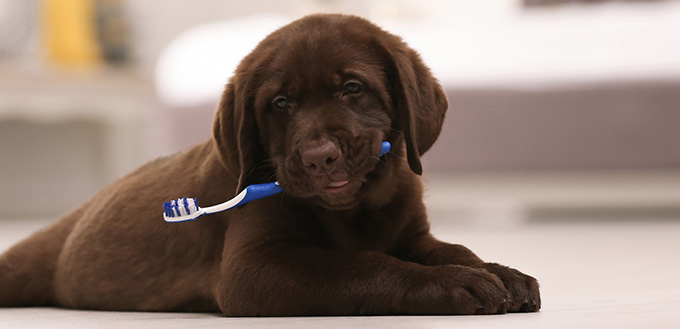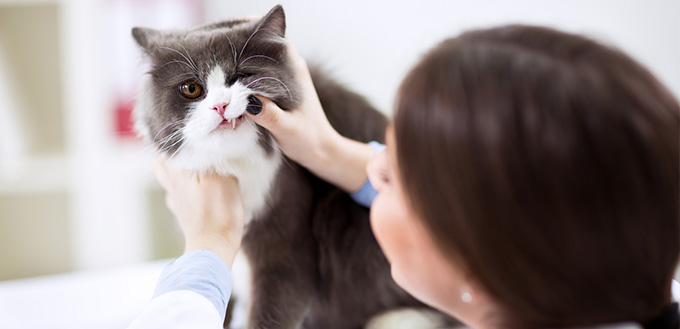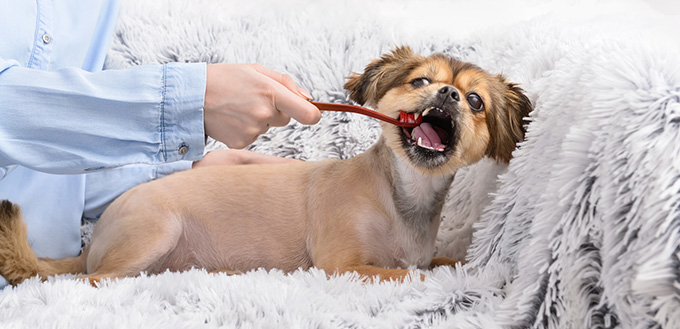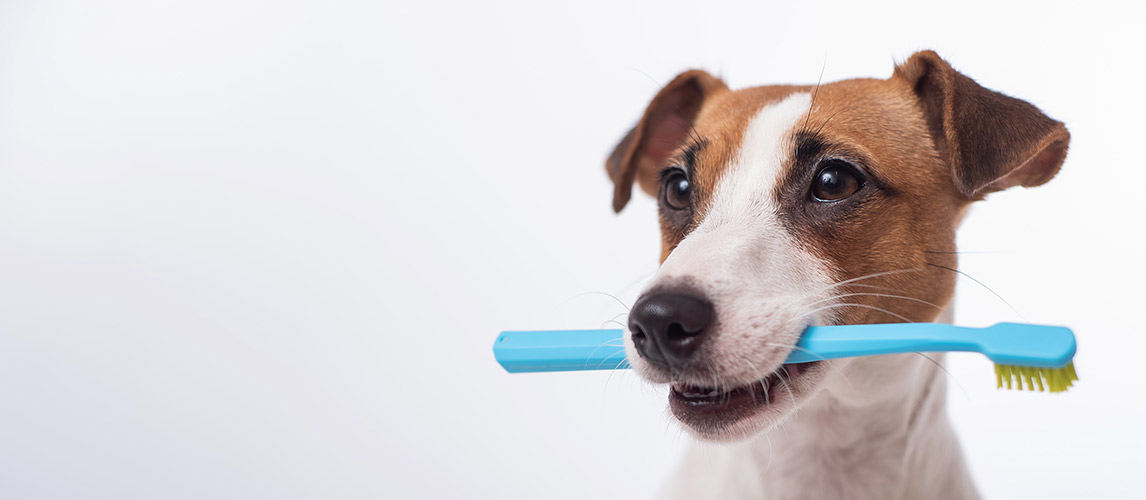Pets need a lot of love, attention and care, and it can be easy to forget an aspect of their health like dental care. From worrying about their behavior, keeping an eye on their coat, and caring for their joints, you can be forgiven for not paying as much attention to your pet’s teeth. Unfortunately, this can result in a lot of misinformation about dental health. We want to dispel the myths of pet dental hygiene to guide you towards keeping your pet’s teeth as healthy as possible.

Dog’s Mouths are Cleaner Than Human Mouths
You have probably heard someone say that dog’s have cleaner mouths than humans do. Many dog owners believe this, and often mention it if they share a little bit of food or sweet little kisses with their best friend. Due to this, it is probably the most common myth about pet mouths out there. Unfortunately, it is not entirely accurate.
The truth is that dogs and humans both have a lot of bacteria in their mouths. The kinds of bacteria, however, can be very different, which may be where the myth comes from. However, bacteria is still bacteria, and, although some bacteria can be good for digestion, this is not the case with dog’s oral bacteria. Dog saliva can still cause infection and other health concerns.
While a few doggy kisses are probably fine, there is a serious concern when it comes to this myth. Some people go a step further and believe that dog saliva has healing properties because dogs lick their wounds, and they then encourage their own dogs to lick their human wounds. This is not a good idea. Dogs lick their wounds as the friction caused by their tongues can dislodge dirt that may be inside the wound. If they lick your wounds, you are risking infection from the bacteria that live in their mouths.
Bad Breath is Normal
Another potentially dangerous myth that surrounds pet dental care is that animals just have naturally smelly breath. This myth is so prevalent that it often puts off potential pet owners from getting a pet in the first place, as they worry that their home will become unpleasantly stinky. However, this is not true.
Animals do not have to have unpleasant breath with proper care and hygiene, and it is, actually, a common and important symptom of a huge number of potential oral concerns. A dog that has a healthy teeth cleaning routine should not have noticeably offensive breath. If you are disturbed by your pet’s breath, it is probably time for a clean. Persistent bad breath, despite regular cleanings, could be an early indicator of a serious health concern, so it is wise not to ignore it.
Related Post: Best Dog Dental Spray
Health concerns that you are potentially overlooking if you ignore bad breath include:
- Periodontal disease, which is commonly referred to as gum disease
- Dietary problems
- Diabetes
- Kidney disease
- Liver disease
Related Post: Best Dog Foods for Kidney Disease
Dry Food Keeps Their Teeth Clean
This third myth is one that is often encouraged by professionals. In fact, it is something we have mentioned on this site before! This is because it is partially true, but it is also important not to overstate the facts, and accidentally encourage poor dental health. Food build up of any kind is still going to cause dental problems, regardless of whether it is wet or dry.
Dry foods can reduce plaque build up on your pet’s teeth because the texture will often ‘rub off’ plaque as they chew. This will contribute to having less plaque build up over the same period of time when compared to using wet foods, which can stick to teeth for much longer. Dry food, however, will still cause plaque to form. Small fibers can get stuck in between teeth, and some dry food chunks are so small that your pet doesn’t bother chewing them at all, which won’t dislodge any dirt and plaque. You must remember that many commercial cat and dog foods have a significant amount of carbohydrates. As carbohydrates are sugars, you can probably imagine the damage they can do to teeth.
Using dry food is still a good idea, but you cannot use it as an excuse to clean your pet’s teeth less often. Make sure you are not relying on dry food to clean your pet’s teeth, and are providing a good dental routine to support the use of dry food. You are risking gum disease and other oral health problems if you don’t.

Dental Chew Toys, Bones and Treats Keeps Your Pet’s Teeth Clean
A similar mistake that pet owners often make is to rely too much on various chew toys, bones and other pet treats that are advertised for their dental benefits. Just like dry food, this myth is based on fact. There are toys and chews that can reduce plaque build up. Some have even been shown to reduce plaque up to 70%! This is, obviously, very beneficial for your pet’s oral health. Just make sure they are accredited by the Veterinary Oral Health Council if you want to ensure their claims are legitimate.
The benefit of using dog chews don’t stop there. All pet owners know that teeth brushing time can be a nightmare, and these treats are great for a quick plaque reduction when your beloved dog has their heart set on resisting a teeth clean. However, it is important that you don’t rely on teeth chews and toys instead of a good dental hygiene routine. Dental chews can never be as effective as brushing your pet’s teeth and bringing them in for regular dental exams. If you rely on dental chews, you are likely to miss important symptoms that could indicate a serious health concern.
There are some circumstances, such as an anxious rescue dog, where you may not be able to regularly brush your pet’s teeth. In these cases, a dental chew is infinitely better than just ignoring their dental health. However, for most pets, it is important that you make the effort to train them to get used to toothbrushes and dental hygiene. Training should start while they are a puppy, but adult dogs can also be taught to let their teeth be brushed.
You Can Use Human Toothpaste and Toothbrushes
Using animal-specific products can sometimes feel like a waste of money. Sure, your dog can’t eat the exact same food as you, but surely toothpaste is just toothpaste? This is a huge mistake for pet owners to make. Animal-specific toothpaste and toothbrushes exist for a reason, and, unfortunately, you cannot save money by using human alternatives.
Human toothpaste contains xylitol, which is very harmful to pets if they eat it. You may think ‘well, they aren’t meant to eat toothpaste’, but the reality is that they will ingest some toothpaste every time you brush their teeth. Humans often do the same, and we are very aware that toothpaste isn’t meant to be swallowed, so just imagine how much a dog or cat must swallow.
You should also be aware that the minty taste of human toothpaste can be very unpleasant for certain animals, which will discourage them from cooperating with you when you need to brush their teeth. This could influence how regularly you even attempt to brush their teeth. If you want to encourage your pet to accept a regular hygiene routine, you must make the routine as pleasant as possible, and having a yummy toothpaste, like chicken flavored, can make all the difference.
Pet-specific toothbrushes can seem even more pointless than pet-specific toothpaste, but they are actually very important for your pet’s oral health. The bristles on a human toothbrush is likely to do damage to your pet’s mouth. This could cause discomfort, or even pain, which will encourage them to resist the process entirely, and, at its absolute worst, wounds to their mouth risk infection. There are a lot of options for pet toothbrushes, including helpful finger brushes for small mouths, so you should be able to find something that will work well for you and your best friend.

Top Teeth Tips
Now you know some common mistakes made by pet owners everywhere, you may be wondering if there is anything else you should know that can help your pet’s oral health. The best thing to do is to take advice from your vet. They will be able to help you create a good hygiene routine. If you want a little more help to know where to start, here are a few more tips that you may find useful.
- Get to know your pet’s particular breed as some breeds are more likely to have certain dental issues. If you know your pet has a genetic predisposition for a dental health issue, you should take them for regular check ups.
- Schedule a regular professional cleaning, even if you have a good routine. A professional cleaning will reach areas that you struggle to reach.
- Your aim should be getting your pet used to cleaning their teeth daily if you want to avoid dental problems. Start when they are still young as 90% of cats that are four years old, or older, are already suffering from a dental problem. It will also help make them more compliant with the process.
Sources:
- Five Ways To Clean Your Pet’s Teeth, Animal Humane Society
- 10 Facts You Need To Know To Protect Your Pet’s Oral, American Animal Hospital Association





